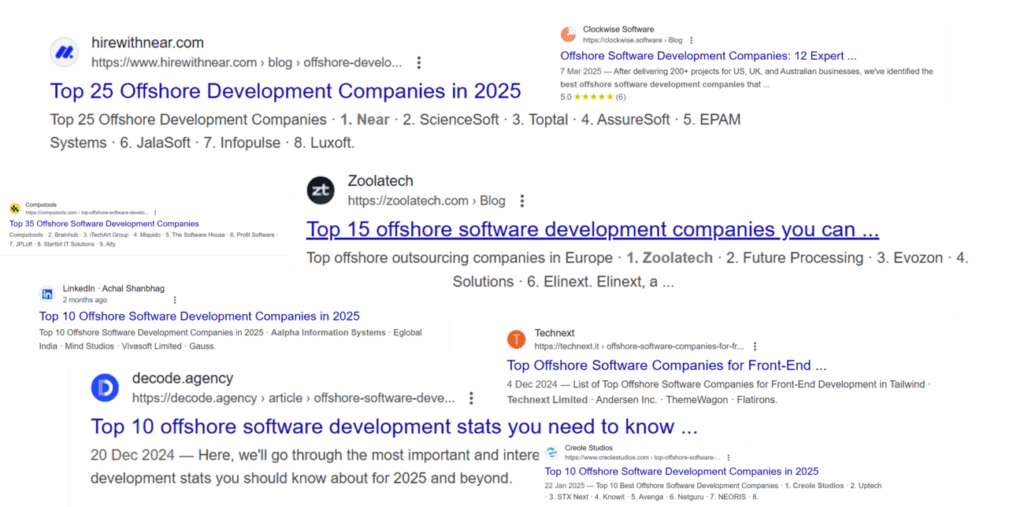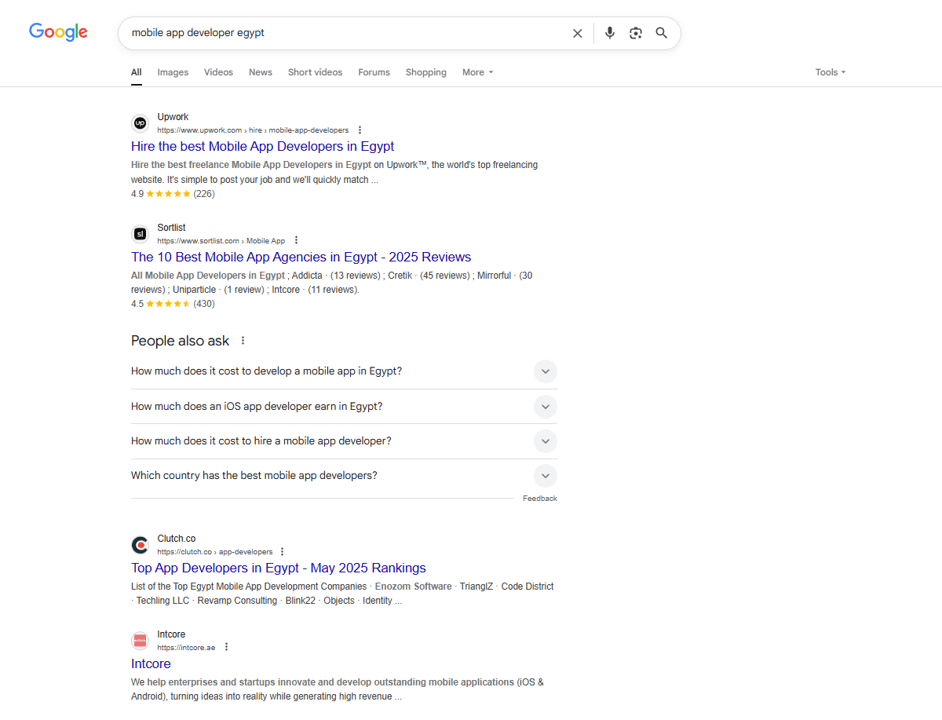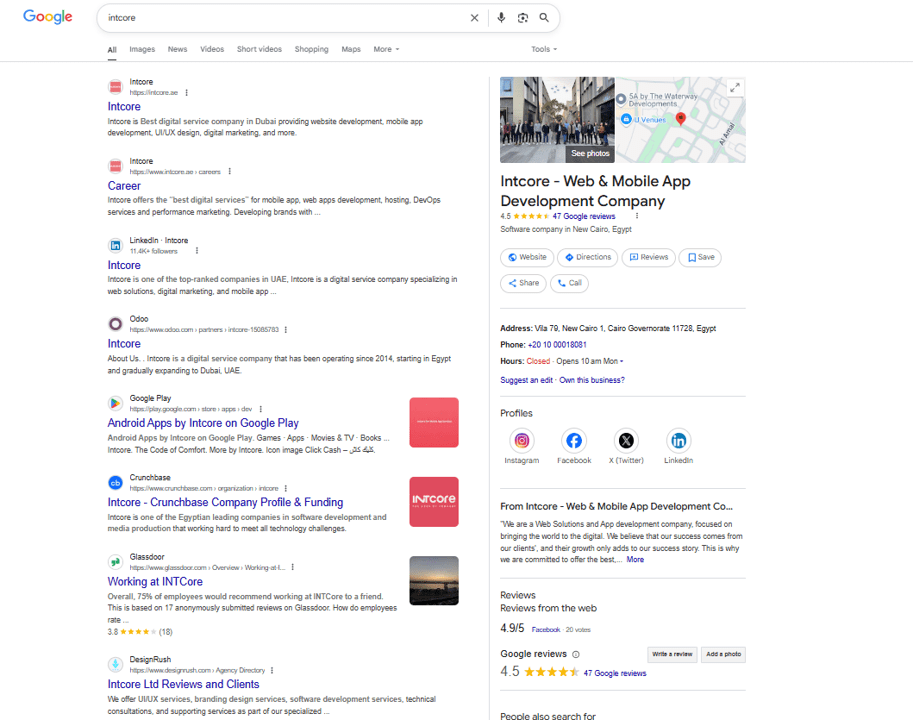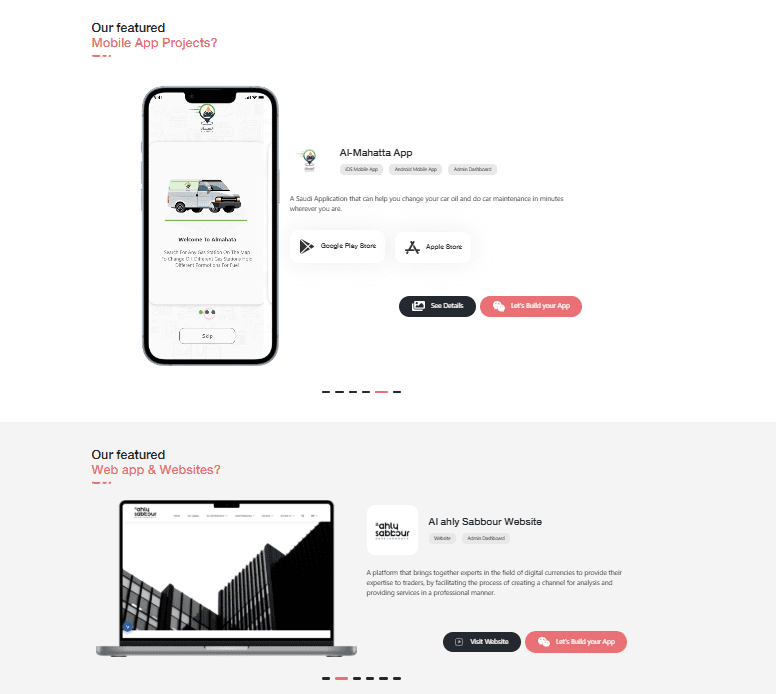When Every Agency Says They’re the Best
Searching online for offshore software development companies goes like this.
Google recommends 50,000 listicles all claiming to rank top development agencies.

You begin scrolling and wonder if the list with 15 entries is more reliable than one with 20.
Wait, this one has just five?
Wait, does that one have 35?!

It’s ok, you tell yourself, let’s keep an open mind.
You open one list, only to find it’s written by a software agency.
And through an impartial process, they’ve crowned themselves ‘king of offshore software development’.

You go back to the search page and realize every list is just a developer’s attempt at self-promotion.
For those who’ve gone through this, here’s a free hug.
For those who haven’t, let us save you a whole lot of unnecessary frustration.
As developers ourselves, if we had to hire offshore software developers, here’s what we’d do.
Step 0: Understand Project Scope

Before approaching a developer, we’d be sure to have details for them to base an estimate on.
We won’t worry about technical specifications, that’s their job to work out.
But for them to work it out, they’ll need us to provide product requirements of the software we plan to build, which means the following:
- Target audience
- Problems solved
- Key features
- Similar apps
When we get approached, this is what we ask for with our App Brief Template.
Without this information, you’d approach ten developers and get ten very different quotes.
Step 1: Decide How We Want to Hire

The way we see it, we can hire one of two ways:
- DIY: Gives more control over our offshore team but is more time-consuming and riskier.
- Developer Recruitment Agency: They do the heavy lifting for us but we pay for their services and must give up some amount of autonomy.
If our top priority was risk reduction, and especially if we were inexperienced and didn’t know how to vet developers, we’d swallow our pride and go with a recruitment agency.
If we’d worked with developers before, and wanted full control over our shortlisting and final selection, we’d go the DIY route and move to Step 2.
Step 2: Shortlist Offshoring Locations

To decide where we might want to offshore our software development, we need to be clear on why we’re offshoring it in the first place.
Yes, most software development projects are outsourced for cost savings.
But some are done to target technical skills or talent pools not available locally.
Some are also outsourced due to government requirements.
Wherever we decide to potentially hire offshore developers, we’d make sure it has the following:
- At least an hour’s overlap of normal working hours
- A common language
Just having these two does wonders to prevent communication breakdowns.
Step 3: Shortlist Agencies

Now comes the hardest part: Vetting agencies from your chosen offshoring locations.
As a rule, the way software development works means almost any development agency can take on overseas clients.
This means we don’t have to specifically seek out offshore specialists in another country.
We can just search like we were from that target country.
So say we really wanted to offshore a mobile app project to Egypt.
We’d Google for mobile app developers in Egypt or Cairo.

We’d 100% skip the awful listicles and check out the actual developers.
The first one we see here is Intcore, so let’s Google them!

Some green flags that we see here:
- A comprehensive digital presence
- A decent number of reviews and it’s close to five stars
- Presence on third-party sites, not just their own
From there, we’d check out their homepage.
Then we’d check out their portfolio of past work.

And if we were satisfied, we’d head over to their contact us page and get in touch.
Then we’d repeat this process with at least four other agencies!
Step 4: Interview Agencies and Choose One

If we’ve provided enough details to appear trustworthy, the agency will get back to us.
Some may immediately have an estimate, which we’d see as a red flag.
It’s just unlikely the information provided in a ‘hello there’ email is enough to create a budget.
What we’d like to see is an invitation to a virtual meeting, where representatives from the agency will ask us about our software project in more detail.
Likewise, it’s our chance to ask them questions, and we’d want to know their:
- Methodology
- Development & Design processes
- Team
- Credentials
Here’s a list of questions we’d ask any app development company to vet them.
This is a two-way interview where we’d keep our eyes and ears open for developer red flags.
And you can bet they’ll be doing the same to make sure we’re not nightmare clients!
We’d repeat this interview process with all the shortlisted agencies that got back to us.
And if we find one we trust, we sign an NDA and start the development process.
Step 5: Don’t Be a Nightmare Client

We admit we enjoy reading stories of offshore software development gone wrong.
Sometimes it is for sure the developer who drops the ball.
But a SaaS or mobile app project can just as easily be derailed by a client unfamiliar with software development.
Even in our personal experience, we’ve had clients both local and overseas who:
- Almost never attended catchups
- Kept requesting more and more new features beyond the original scope
- Suddenly couldn’t make payments and asked us for discounts
After having dealt with these clients, we’d never do it to a fellow developer…and we ask nicely that you don’t either 😀
If you’ve hired your offshore software development agency well and both of you play your part in bringing the app or SaaS to life, you’ll have an MVP in no time, and a fully functional product not long after.
However, if just reading this already feels like a battle, maybe you don’t have to do it.
Maybe the right offshore developers were right in front of you all along.
Step 6. Make Upstack Studio Your Offshore Software Developers
Upstack Studio is a small, dedicated team that’s spent the past six years helping businesses build custom software solutions.
Many of our clients are overseas, and working across time zones is second nature to us.
All it takes is a few well-chosen digital tools, and our own version of Agile methodology.
If you’d like to skip the search and work with a small, senior team that pushes back when needed and gets things done, we might be the right fit.
Regardless, happy offshoring!
If you’re looking to build a mobile application, check out our portfolio of past projects and contact us if you like what you see. Also, consider joining our mailing list for a one-stop resource on everything from micro-SaaS validation all the way to execution and promotion. Get a nifty list of questions to ask app developers when you sign up!
Download this template now so you know exactly what to ask App Development Agencies! Let us know where should we send it through the form below.



